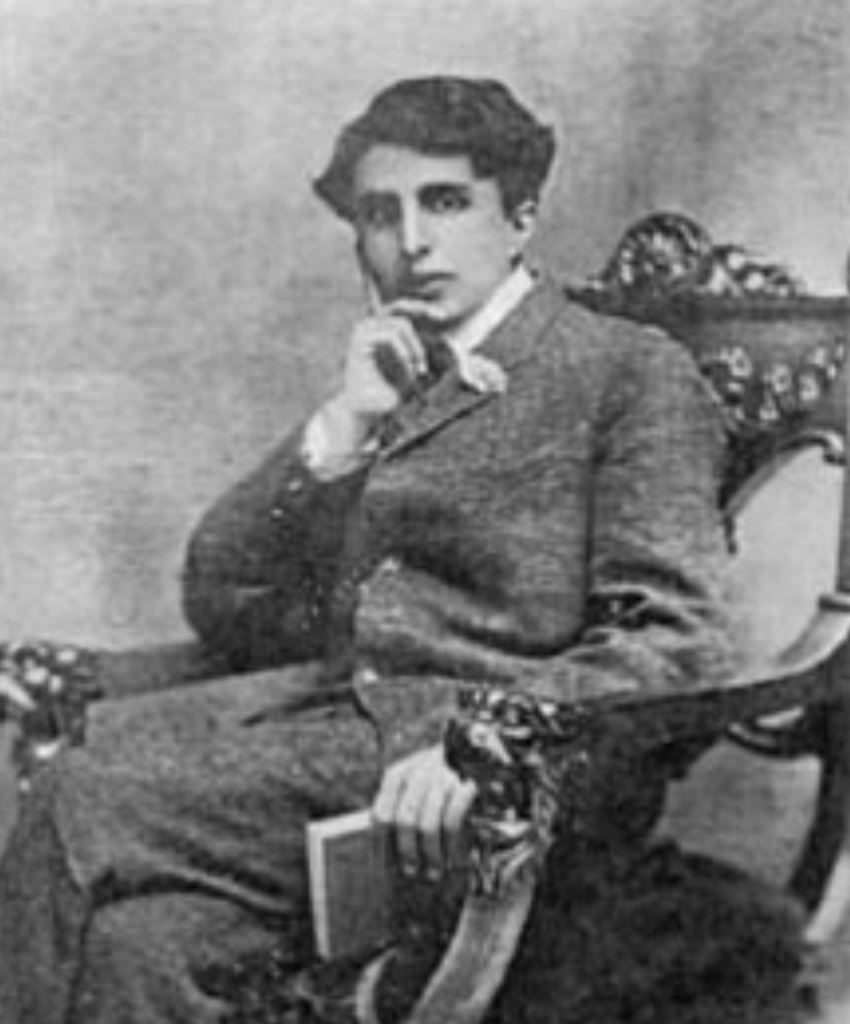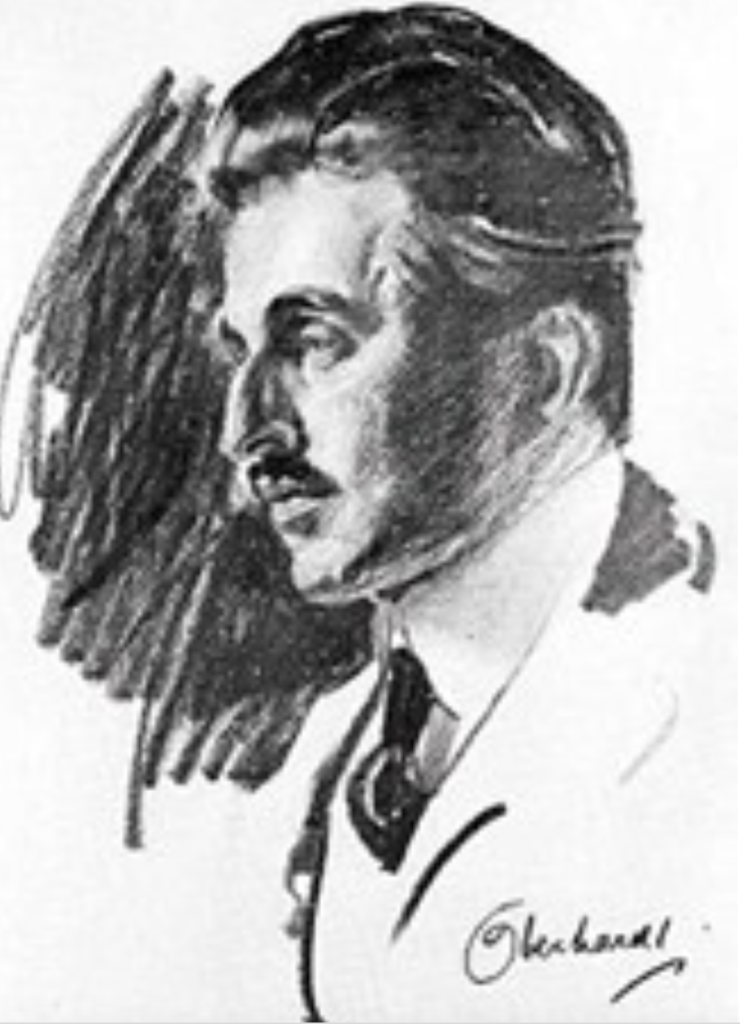Pathbreakers of Arab America—Ameen Faris Rihani

By: John Mason / Arab America Contributing Writer
This is the twenty-ninth in Arab America’s series on American pathbreakers of Arab descent. The series includes personalities from entertainment, business, sports, science, academia, journalism, and politics, among other areas. Our twenty-ninth pathbreaker is Ameen Faris Rihani, a preeminent Arab American Scholar. He was born in Freike, Lebanon, in 1876, the son of Maronite Christian parents, and emigrated to New York in 1888. He became an American citizen in 1901. Rihani was not only a fine Lebanese American writer and an intellectual and political activist, but he was also a major figure in the Arab diaspora literary movement developed by Arab emigrants in North America. He died back in Lebanon in 1940.
Preeminent Arab American scholar, diplomat, and visionary, Ameen Rihani opened many doors into cross-cultural understanding
Ameen Rihani was born in the Mount Lebanon community of Freike, on November 24, 1876. The oldest of six children and the oldest son of raw silk manufacturer, Fares Rihani, he was sent with his brother to New York City in 1888. His father joined the boys a year later. According to Wikipedia’s biography of Arab Americans, Ameen attended school, learning basic English. Because of his father’s need for an English-speaking chief clerk, interpreter, and bookkeeper, Ameen was drafted into the company at age 11.
Using his time carefully, Ameen improved his English and became acquainted with the writings of well-known American and European writers. He also perfected his spoken English, deciding to join a touring stock company for a while. When he returned to New York, Ameen convinced his father to provide him with a normal education for a professional career. This led to his enrollment in the New York Law School in 1897, but his studies were interrupted by a lung infection. His father then sent Ameen back to Lebanon to recover, which gave Ameen the chance to study Classical Arabic as well as some of the more famous Arab poets. This opportunity also led to his translation of these poets’ works into English. Rihani purportedly became the first Arab to publish in English while safeguarding his Arabic.
On his return to New York, according to Wikipedia, Ameen “joined several literary and artistic societies in New York, such as the Poetry Society of America and the Pleiades Club, and also became a regular contributor to an Arabic daily newspaper, Al-Huda, published in New York. He wrote about social traditions, religion, national politics, and philosophy. Thus, he began his extensive literary career, bridging two worlds. He published his first two books in Arabic in 1902 and 1903.”
Returning to Lebanon for a second time in 1904, Rihani stayed this time for six years of desired solitude. There he wrote and published in Arabic two volumes of essays, a book of allegories, and a few short stories and plays. Ameen, who was influenced by the American poet, Walt Whitman, became known for introducing prose poetry to Arab literature. In this same period of solitude, Rihani wrote The Book of Khalid, published later, in 1911 on his return to New York. This was the first English novel written by an Arab American. Interestingly, it was Lebanese American Khalil Gibran, later famous for his work, The Prophet, who drew the illustrations for The Book of Khalid.
Ameen married Bertha Case, an American artist, in 1916. She was part of the Matisse, Picasso, Cézanne, and Derain group in Paris, and exhibited her work with them. In his peacemaking role, he and Bertha visited Pope Benedict XV in 1917. This was part of an attempt to end World War I. He also met with former U.S. President Theodore Roosevelt that same year to make a case for the rights of the Palestinian people. Ameen was invited in 1919 to represent Arab interests at the Hague Peace Conference and in 1921 he served as the only Near Eastern member of the Reduction of Armaments Conference in Washington, D.C.
Ameen Rihani, according to Wikipedia, died at age 64 on September 13, 1940, at 1:00 pm, in his hometown of Freike, Lebanon. The cause of his death was a bicycle accident which resulted in infectious injuries from multiple fractures of the skull. The news of his death was broadcast to many parts of the world. It caused great emotion not only in Lebanon but throughout the Arab world. Representatives of Arab kings and rulers and foreign diplomatic missions, together with leading poets, writers, and other intellectuals from Lebanon and the Arab World, attended the funeral ceremony. He was laid to rest in the Rihani Family Mausoleum in Freike. Thirteen years after his death, in 1953, his brother Albert established the Ameen Rihani Museum in Freike to honor his legacy.

‘Diplomat for the world and a window into Lebanon’s beauty’: an Arab America book review of Ameen Rihani’s The Heart of Lebanon
On the May 2021 release of The Heart of Lebanon, one of Ameen Rihani’s monumental works with a new English translation, Arab America interviewed Ameen’s niece, May A. Rihani. She was then Director of the George and Lisa Zakhem Kahlil Gibran Chair for Values and Peace at the University of Maryland. This work is considered to be one of Rihani’s most famous works of Arab literature because of how he tells the stories of the Lebanese countryside. It is written in the style of a travelogue, in which Rihani transports his readers to the rural villages in Lebanon, traverses all the exquisite historical sites there, and meets many interesting people along the way.
May Rihani characterizes The Heart of Lebanon, almost anthropologically, as Ameen “explores the rural villages of Lebanon, the mountains in the north, [learning] about the villagers’ traditions and their daily lives, and I see the ‘heart’ as how he captured the beauty of daily life, hard work, family, the importance of hospitality, and most of all, his love of the land. This is the heart and spirit of Lebanon according to Ameen Rihani.” May sees the work as valuable to Lebanese American children, as they “get to remember their culture and where their parents came from. She sees her uncle’s importance as “one of the modern world’s earliest diplomats because, in the 1920s, he visited the entire Arab peninsula and met with numerous kings, leaders, and other high-ranking officials. Rihani also made it his mission for Americans to know of the East and for Arabs to know of the West.”
Importantly, May Rihani avers that her uncle’s greatest gift was his worldview. She noted, “He had a vision and a mission that was multiculturalism. He wanted the West to understand and value the Arab culture as well as that the Arabs knew and valued Western culture. Essentially, he was an ambassador between East and West, and he wanted them to be partnered together. Finally, he dedicated himself to understanding the West and the Arabs.” May also noted, were he alive today, “he would have been furious about the unfortunate and unfair animosity of Americans to Arabs, but he would have studied all these problems and then turned his emotions into action.” She also stressed her uncle’s aversion to “any forms of oppression.”

Rihani—an early and strong advocate for Arab and Palestinian causes
Rihani’s journey brought him to a multicultural world, which decidedly shaped his worldview. It was a perspective that recognized the importance of diversity in shaping his deep commitment to cross-cultural understanding. This worldview was triggered by his move to New York, itself a multicultural mix from around the world. It also influenced his writing career, which led him to essays on Arab identity, the importance of a cultural heritage, and the desire for unity among the Arab World. His seminal work, The Book of Khalid, stressed themes of identity, multiculturalism, and a perceived conflict between Eastern and Western values.
Rihani was very early in the game in his vocal advocacy for Arab unity and Palestinian rights. With the breakup of the Ottoman Empire, it was a time for new states to emerge out of the rubble of war. It was that event that triggered Rihani’s campaign for Arab self-determination. With the Zionist movement afoot, he strongly advocated for the Palestinian cause, pushing for a fair solution to Palestinian rights and self-determination. It was not just Ameen’s elegant writings on advocacy, but his diplomatic engagement with political leaders to promote the Arab cause. This showed how easily he could translate from the world of intellect to the world of action.
How much we could use Rihani’s perspective today in promoting his rich understanding of challenges facing the Arabs but especially the Palestinian people? He had a unique way of presenting complex ideas not only to Arabs but to an international audience. In these complex days of war, we could sorely use him as a source of hope and determination for all who dedicate themselves to social justice and human rights.
Sources:
–“Ameen Faris Rihani,” Wikipedia Biographies of Arab Americans, 2023
–“’A Diplomat for the World and a Window into Lebanon’s Beauty’: A Book Review of The Heart of Lebanon,” by Ameen Rihani, conducted by Claire Boyle, Arab America, 4/21/2021
John Mason, Ph.D., focuses on Arab culture, society, and history, and is the author of LEFT-HANDED IN AN ISLAMIC WORLD: An Anthropologist’s Journey into the Middle East, New Academia Publishing, 2017. He has taught at the University of Libya, Benghazi, Rennselaer Polytechnic Institute in New York, and the American University in Cairo; John served with the United Nations in Tripoli, Libya, and consulted extensively on socioeconomic and political development for USAID and the World Bank in 65 countries.
The views and opinions expressed in this article are those of the author and do not necessarily reflect the position of Arab America.
Check out our Blog here!









